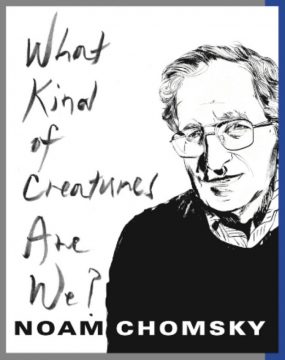From the Columbia University Press blog:
 Idan Landau: This book develops many ideas and themes that your readers will recognize from your earlier works. Still, I sense a new, or at least a more pronounced thread of skepticism running through it—especially as regards the limits of human cognition. “Mysteriansim” is a form of skepticism, so it is no wonder that one encounters Hume in these pages much more often that one did in your earlier writings. I wonder about the roots of this shift: Is it a natural perspective one gains with old age (Ecclesiastes-style wisdom)? Or is it a well-directed response to the over-optimism you see in certain branches of theoretical cognitive science? Jerry Fodor, perhaps, has gone through a similar process of “disenchantment” with the prospects of the cognitive enterprise between his Modularity of Mind (1983) and The Mind Doesn’t Work That Way (2000). Certain things you say may strike some as a defeatist position, which cannot inspire truly groundbreaking work. After all, if we wouldn’t constantly try to push against our limits, how would we know where they are?
Idan Landau: This book develops many ideas and themes that your readers will recognize from your earlier works. Still, I sense a new, or at least a more pronounced thread of skepticism running through it—especially as regards the limits of human cognition. “Mysteriansim” is a form of skepticism, so it is no wonder that one encounters Hume in these pages much more often that one did in your earlier writings. I wonder about the roots of this shift: Is it a natural perspective one gains with old age (Ecclesiastes-style wisdom)? Or is it a well-directed response to the over-optimism you see in certain branches of theoretical cognitive science? Jerry Fodor, perhaps, has gone through a similar process of “disenchantment” with the prospects of the cognitive enterprise between his Modularity of Mind (1983) and The Mind Doesn’t Work That Way (2000). Certain things you say may strike some as a defeatist position, which cannot inspire truly groundbreaking work. After all, if we wouldn’t constantly try to push against our limits, how would we know where they are?
Noam Chomsky: We should certainly push against our limits, just as the sciences have done, with remarkable results, since lowering their aspirations as the import of Newton’s discoveries set in. What for me at least is the most important part of WKC is the first chapter: the review of work that has tried “to push against our limits.” The results discussed were not considered within the realm of possibility only a few years ago. And going farther back, we may recall that a prevailing structuralist doctrine in the fifties was the “Boasian thesis” mentioned in chapter 1, holding that with marginal exceptions, languages can differ arbitrarily and that each new one must be studied without preconceptions.
My own concern with “problems and mysteries” (in the organism-relative sense that I am using) is not recent. In print, it goes back to an essay in a 1976 collection in memory of my close friend Yehoshua Bar-Hillel (“Problems and Mysteries in the Study of Human Language,” in Language in Focus, ed. A. Kasher)—topics that we had discussed privately well before.
More here.
